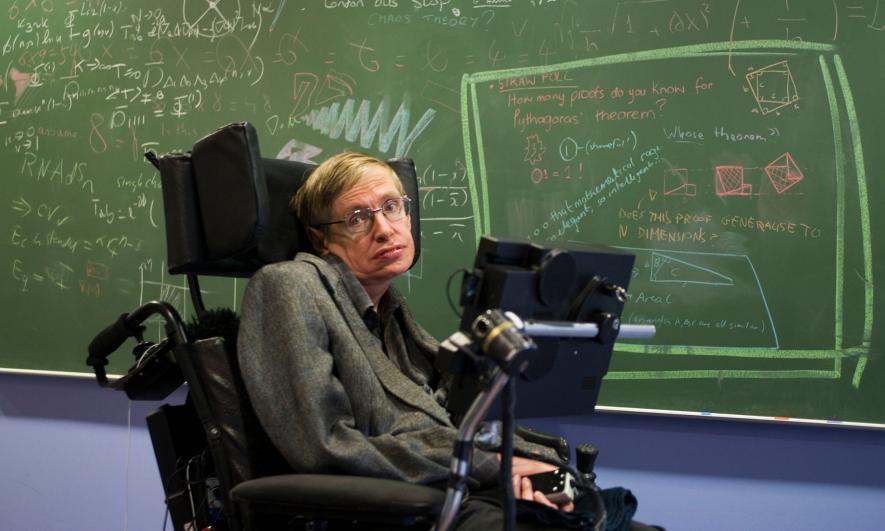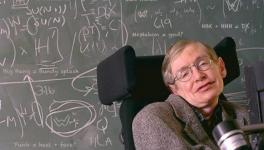Stephen Hawking: Explainer of the Universe

“I regard the brain as a computer which will stop working when its components fail. There is no heaven or afterlife for broken-down computers; that is a fairy story for people afraid of the dark.” So said Stephen Hawking in a 2011 interview, giving us a glimpse of his beliefs as well as his forthright, and mordantly humorous, style.
Early morning on 14 March 2018, the computer stopped working – Hawking a colossus of our times who did as much for investigating the cosmos as for popularizing this difficult science for common people passed away at the age of 76. Diagnosed with motor neuron disease when he was just 21, doctors had given him just two more years of life. But he astounded everybody by not just living for 55 years more, but also for filling those years with theoretical research on the origin of our Universe and investigation of such unimaginable mysteries like the birth and death of black holes, the inflation of Universe, and the beginning of time and space.
His achievements were spell-binding but the image of his diseased body, confined to a wheelchair and linked to a computer for expression also became known throughout the world. It was seen as a symbol of the almost super-human capacity of human mind engaged in understanding the infinite Universe.
Hawking first became known in 1970 when, with Roger Penrose, he showed that a singularity was where the Universe started off from. All energy and matter were collapsed in this point. The duo extended the mathematics of black holes to the whole Universe to arrive at this.
In 1974, using quantum theory Hawking posited that black holes would emit radiation and ultimately die off. A corollary of this would be that all the information that fell inside the black hole would also vanish. This caused a celebrated uproar in the scientific world because it was a firm belief that no information can ever be lost. Later, Hawking rejected his own conclusion and declared (at a pub) through his voice synthesizer that “maybe information loss doesn’t occur”.
Hawking theorized in 1982 that tiny ripples (quantum fluctuations) in matter could have given rise to the initial period of expansion of the Universe immediately after the Big Bang.
Many of Hawking’s ideas, especially those related to quantum gravity on which he continued to work till his death, were not always accepted by the scientific community. But then, science works like that – ideas evolve, get rejected or proved, and more ideas come up.
Hawking’s other major contribution was the skill and dedication he applied to popularization of science through a series of books that became bestsellers. He shot to stardom with his 1988 book A Brief History of Time which has been translated into 40 languages and sold over 25 million copies. This was followed by The Illustrated Brief History of Time (1996) and The Universe in a Nutshell (2001), both having spectacular images and illustrations, all created painstakingly under Hawking’s supervision from his wheelchair and computer. In 2007 he also co-authored (with his daughter Lucy) the children’s science book George’s Secret Key to the Universe (2007). His last book was The Grand Design (2010) which explored how humankind’s knowledge of the Universe has grown over the ages its current state.
Hawking had a unique interest and flair for thinking and commenting on social issues, marking him out as a rarity among otherwise cloistered scientists. Back in 1968, he marched with thousands of other young people against the Vietnam war. He pulled out of a conference in Israel after being persuaded about the Palestinian cause. He vocally supported socialized medicine and opposed cuts in the British NHS saying, “"The more profit is extracted from the system, the more private monopolies grow and the more expensive healthcare becomes. The NHS must be preserved from commercial interests." He condemned the US-UK invasion of Iraq in 2004 calling it a war crime and based on lies. He repeatedly warned against not taking climate change seriously. In fact he had his own critique of capitalism for creating ever-increasing inequality, saying “most people can end up miserably poor if the machine-owners successfully lobby against wealth redistribution”.
Stephen Hawking’s life and thoughts can be best summed up in his own words: “No one created the universe and no one directs our fate. This leads me to a profound realization. There is probably no heaven and no afterlife either. We have this one life to appreciate the grand design of the universe—and for that I am extremely grateful."
Get the latest reports & analysis with people's perspective on Protests, movements & deep analytical videos, discussions of the current affairs in your Telegram app. Subscribe to NewsClick's Telegram channel & get Real-Time updates on stories, as they get published on our website.




















